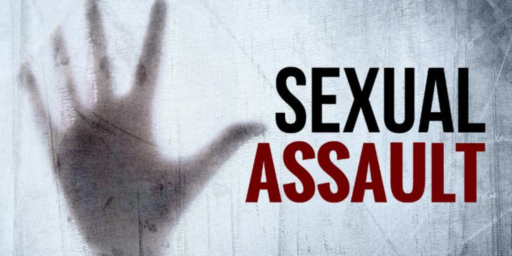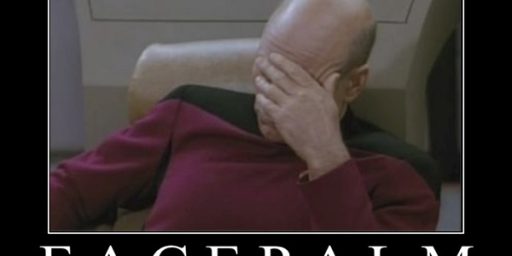Illinois’ 66 Percent Tax Hike
Faced with mounting debt, the lame duck Illinois legislature rushed through a massive tax hike in the wee hours this morning.
Faced with mounting debt, the lame duck Illinois legislature rushed through a massive tax hike in the wee hours this morning:
With only hours left before new state lawmakers were to take over, Illinois’s State Legislature narrowly approved early on Wednesday an increase of about 66 percent in the state’s income tax rate.
The vast size of the increase, the rarity of such increases here — the last one came two decades ago — and the hour of the vote (in the wee hours of Wednesday) all reflected the urgency and depth of this state’s fiscal crisis.
Even grudging supporters of the tax increase, which won no Republican support in a state capital controlled by Democrats, voiced a desperate sense of regret over the circumstances in which Illinois finds itself. State Representative Elaine Nekritz, a Democrat who voted for the increase, described her decision as an alternative “between bad and worse.” Another Democrat cautioned his colleagues: “We don’t have a better choice today.”
While a “66 percent hike” sounds unconscionable, it’s also a bit misleading:
Under the legislation, the income tax rate would, at least temporarily, rise to 5 percent from its current rate of 3 percent. Lawmakers had talked about an even steeper increase, but set that aside as the hours went by and the debate grew increasingly emotional. The rate for corporate taxes would rise to 7 percent from its current rate of 4.8 percent. As part of the deal, the state’s spending growth would be limited from one year to the next over the next four years.
If the headlines were calling it a “2 percent hike,” it would seem less dire. But that’s still a big bite, especially on top of all the other taxes people are paying. Much less during such bad economic times. And the means used to enact the increase — having it voted on by lawmakers on their way out the door and thus immune to the wrath of the voters — is unconscionable.
Then again, it’s unlikely that the incoming band will overturn this. They really need the money:
Illinois faces a budget deficit of as much as $15 billion, owes some $8 billion in unpaid bills to social service agencies, doctors, dentists and others, and is receiving mounting signs of worry from bond investors.
Still, it was the closest of close calls.
A triumphant Gov. Pat Quinn congratulated fellow Democrats early today after the Illinois Senate and House sent him a major income tax increase without a single Republican vote in favor.
Quinn smiled and shook hands on the floor of the Senate around 1:30 a.m. after the Senate voted 30-29 for the bill, which would raise the personal income tax-rate by 67 percent and the business income tax rate by 46 percent.
The House passed the bill hours earlier Tuesday night — likewise without a vote to spare and with nary a Republican in support.
Quinn had to buy off his own supporters to do it:
The plan nearly faltered in the Senate when black lawmakers balked at the House’s decision to remove a property-tax relief component from the plan and failure to approve a cigarette tax hike for schools. But Quinn met privately with members of the Senate black caucus, who said he pledged to pump $250 million from the income tax increase into schools for each of the next four years.
I look forward to the reaction of my colleague, Dave Schuler, who’s lived in Chicago for decades.







“While a “66 percent hike” sounds unconscionable, it’s also a bit misleading:”
Weirdly misleading, too. It should have been made clear that while the tax rate did increase by 66%, it did not increase to 66%. What, we want to confuse the innumerate??
Once again the Democrats vote to pay the bills. By voting no AND failing to provide any realistic alternative, republicans demonstrate once again they have no fiscal responsibility whatsoever.
“If the headlines were calling it a “2 percent hike,” it would seem less dire.”
It would also be incorrect. A 2% hike would leave the tax rate at 3.06. I guess the innumerate posted first.
@Herb and @Bandit
Everyone is saying “66 percent,” which is right insofar as it goes. But most people will likely read it as having gone up 66 percentage points rather than a 2/3 increase from a relatively small base.
Mostly, it’s a function of headline convention, which encourages brevity. And it also serves the headline’s purpose, which is to grab reader attention.
The intersting part to me was that the bill requires future spending increases to be capped at 2 percent, or at least one paper says, the tax hike is rescinded. Republicans complained that the caps are cumulative, amounting to 17% increase in four years. The Governor shot back that Medicaid costs have historically increased faster than the rate of inflation, so in order just to meet the caps, the State will have to continually gut all other state programs.
Happy times.
This just in: people to abandon Illinois even faster, leaving an even smaller tax base.
The funny part is the 66% tax hike only made the rate half of what they hit us for in California on income tax! Then throw in the sales tax of 8.25 to 10.25% (it varies based on what City and/or County you are in.)
Sadly, I think the income tax hike was necessary. Even more sadly I don’t think it’s sufficient. Unless Illinois’s economy improves dramatically over the next year (unlikely), they’ll be in precisely the same fix next year as this year even with the tax hike. Like most states Illinois primarily depends on three factors for income: retail sales, property values, incomes. When all of those decline or are stagnant, it presents problems for the state’s revenues.
Illinois’s two largest expense items are healthcare and public employee pensions. Between them they comprise about half of the state’s budget and unless their growth can be limited the legislature will need to increase rates year after year.
In Illinois passing legislation only requires a simple majority in each house of the legislature and that the bill be signed by the governor. The Democratic Party has controlled both houses of the legislature and the governor’s mansion for a decade. Illinois’s problem isn’t a partisan deadlock as that term is generally understood.
It’s more like incumbents don’t want to fall on their swords. Like the increased state budget for healthcare and public employee pensions that won’t be any different next year.
MstrB:
Don’t be too envious of Illinois’s income tax being lower than California’s. Chicago already has the highest sales tax in the country and there’s no Prop. 13 in Illinois. Per capita property taxes paid in Illinois are about 15% higher than in California.
What we really have here is the Illinois politicians voting to pay for all their promises they made over the last 30 years. When they ran they said, “If you vote for me, I will spend this money on you.” These promises resulted in billions being spent as entitlements. Years of buying votes with taxpayer money has resulted in the mess we are in now. In addition, when politicians continue to find ways to spend more money, this results in committing money to these entitlements forever. Illinois politicians are cowards, it is easier to spend money than it is to take that money away. Buy providing free services and job guarantees Illinois politicians have caused a huge financial mess. Illinois Politicians use taxes to buy votes, “I made this promise, now the rest of you give me the money to pay for it.” It’s a shame that we don’t have politicians who care about taxpayers, but rather care about their positions of power and the cadillac benefits that go with it.
I support the increase on personal income tax rates.
A number of Illinois Republican legislators have agreed for a need to taxes, but have emphasized that tax increases alone won’t do it. They have offered numerous reform proposals, a few actually might be moving forward. But at the end of the day, if tax increases are necessary and if Republican votes aren’t necessary, then it doesn’t make a lot of sense for Democrats to vote to gut social services and reign in the public employees union.
I’m with Dave. It’s unfortunately necessary, and not enough. I don’t mind the extra bite of my income too much (it’s better than the alternative), but I wish I had confidence the state legislature would take this year to fix the budget and pension issues that this doesn’t solve. They won’t.
Jack Randlich — I simply don’t understand your point. If Illiinois politicians ran for years on the platform of “if you vote for me, I will spend money on you,” it’s pretty clear that the majority of voters wanted this money spent — and thus it is perfectly rational that taxes be raised to pay for the spending.
You seem to believe this is some kind of dastardly trick. It’s just the opposite — democracy in action. Just because there are people in the state who do not believe that taxes are a greater evil than slavery, that doesn’t mean that they are children who have been duped. It’s possible that they simply have a different view of the way society is supposed to work.
” It’s unfortunately necessary, and not enough. I don’t mind the extra bite of my income too much (it’s better than the alternative), but I wish I had confidence the state legislature would take this year to fix the budget and pension issues that this doesn’t solve. They won’t.”
Then why is it necessary?
Because the state isn’t paying its bills now.
So if you give them more money and they don’t fix their budgetary issues – commenter says and experience tells us they won’t – why are they raising taxes? Except to throw more money down the rathole?
“While a “66 percent hike” sounds unconscionable, it’s also a bit misleading.”
Nope, not misleading, fact. A 66% hike is exactly what it is (a little higher, actually). Passing it off as only 2% would be disingenuous, but in the context of this story, “disingenuous” might be the least offensive descriptor you could use for this disgusting subversion.
For interested parties, Mr Schuler has a quantitative treatment of the required taxation to deal with IL spending issues. You’ll have to go back a few comments.
I’ll make a prediction: the projected revenue will come in far below expectations. Under-reported: taxes on business increased dramatically. (Sorry all you unemployed.) A few years ago Iowa and Indiana were running radio ads in IL inviting businesses to move, or at least open any new ops in those states. That will take time, but it will happen for those with options. My formerly great home state is committing economic suicide.
Oh.. At Glittering Eye
Huh?
“Everyone is saying “66 percent,” which is right insofar as it goes. But most people will likely read it as having gone up 66 percentage points rather than a 2/3 increase from a relatively small base.
Mostly, it’s a function of headline convention, which encourages brevity. And it also serves the headline’s purpose, which is to grab reader attention.”
Wow, how remedial in our math have we become in this country? “66 percent” is exactly correct and honest. My income tax in Illinois will be 66% higher than last year. That’s a fact and a very clear way to say it. You think people are going to read that as rate increase from 3% to 66%? That’s an interesting comment on the economic and mathematical literacy of the average Illinois citizen. If you’re right, it goes a long way to explain the continued dominance of the political combine in Illinois.
Time to move to Texas.
Drew, the top personal income tax rate in Illinois is still going to be at least a percentage lower than all neighboring states, except for Indiana.
The corporate tax increase, I don’t think was good though. I didn’t support that.
bob : Texas is screwed up financially as is and while you’re not paying a state income tax you will be paying taxes (usually multiple fees) on every single service you use (even payments for online games like World of Warcraft are taxed). So in the end you pretty much pay the same rate as you would in Illinois. On top of that Texas is also looking at some serious financial hardships…
The thing I hate most about living in Texas is that all the government services have terrible lines. The DMV is at least a 4 hour wait and there’s lines forming well before they even open. Meanwhile in Illinois I could do anything in under an hour (usually under 30 minutes)…
That’s an interesting comment on the economic and mathematical literacy of the average Illinois citizen.
Seems to me an entirely banal comment. Lots of people are stupid and/or don’t pay attention.
Time to move to Texas.
You think it will be better there? Delusional.
It is time that Illinois voter to think who will send back or will not be send back to Illinois congress next Election for House representatives and state senator. Think Think and Think very hard
Got to pay old Raul what he thinks he worth. He didn’t leave an important job at the White House without a reason.